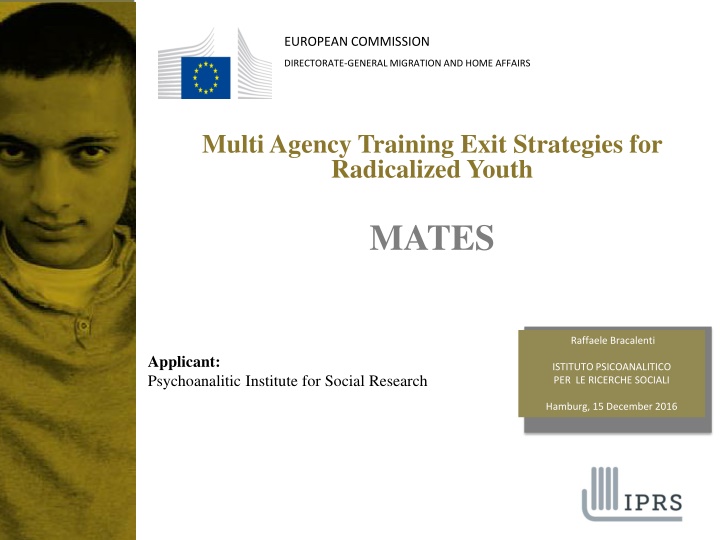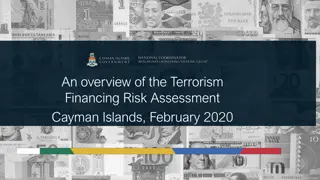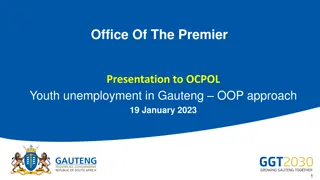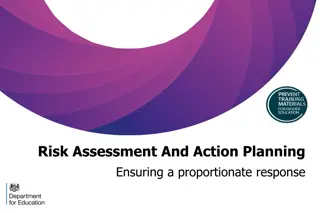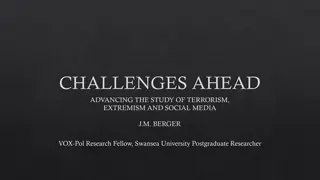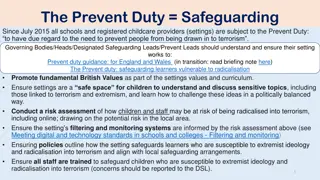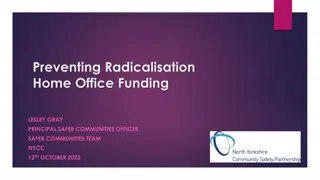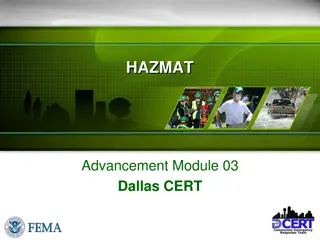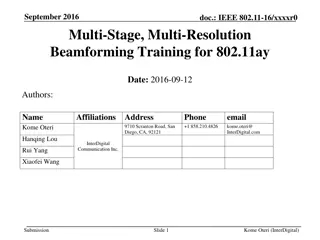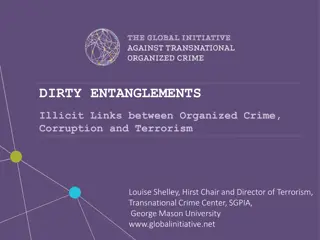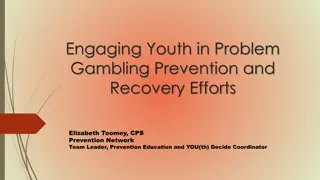Multi-Agency Training for Radicalized Youth: Defeating Terrorism through Desensitization
This project, led by the European Commission, aims to combat radicalization and terrorism by implementing multi-agency training programs focused on social reintegration, prevention of recruitment, and increasing motivation among young individuals. Partnering with several universities and organizations across Europe, the project emphasizes the use of common curricula based on counter-terrorism approaches to de-sensitize radicalized youth and facilitate their successful reintegration into society. Professionals such as probation officers and frontline practitioners receive specialized training to address the challenges posed by radicalized youth and prevent re-recruitment to terrorist activities.
Uploaded on Sep 22, 2024 | 0 Views
Download Presentation

Please find below an Image/Link to download the presentation.
The content on the website is provided AS IS for your information and personal use only. It may not be sold, licensed, or shared on other websites without obtaining consent from the author.If you encounter any issues during the download, it is possible that the publisher has removed the file from their server.
You are allowed to download the files provided on this website for personal or commercial use, subject to the condition that they are used lawfully. All files are the property of their respective owners.
The content on the website is provided AS IS for your information and personal use only. It may not be sold, licensed, or shared on other websites without obtaining consent from the author.
E N D
Presentation Transcript
EUROPEAN COMMISSION DIRECTORATE-GENERAL MIGRATION AND HOME AFFAIRS Multi Agency Training Exit Strategies for Radicalized Youth MATES Raffaele Bracalenti Applicant: Psychoanalitic Institute for Social Research ISTITUTO PSICOANALITICO PER LE RICERCHE SOCIALI Hamburg, 15 December 2016
PROJECT PARTERSHIP Tartu University (TU), Estonia Universit La Sapienza, Italy Alma Mater Europaea Maribor (ECM), Slovenia Christlichen Jugenddorfwerk Deutschlands (CJD), Germany Universitat Aut noma Barcelona (UAB), Spain Catholic University of Porto (CUP), Portugal
PROJECT OVERALL AIM DEFEAT RADICALIZATION AND TERRORISM EXIT STRATEGIES MULTI-AGENCY and MULTI- DICIPLINARY SCIENTIFIC APPROACH DESENSITIZATION PROGRAMMES Common Curricula LIASON WITH LOCAL COMMUNITIES
PROJECT OVERALL AIM DEFEAT RADICALIZATION AND TERRORISM Social reintegration of young terrorists Prevent the risk of recruitment Increase the motivation of these youth to actively contribute to prevent and tackle terrorism
COMMON CURRICULA: Based on the Common Curriculum Counter Terrorism approach used by CEPOL The basic psychological mechanism in the building of a terrorist personality Profiles of youth involved Scientific grounded learning material: COUNTER NARRATIVES Key-elements to plan a tailored de-sensitization project/assessment tool to evaluate the risk of failure Criteria to evaluate the level of adhesion to the terrorist ideology
COMMON CURRICULA: Based on the Common Curriculum Counter Terrorism approach used by CEPOL Provide professionals - PROBATION OFFICERS and FRONTLINE PRACTITIONERS working with young people in probation - with SKILLS AND CAPACITIES that allow them: To de-sensitize already radicalized youth through counter-narratives and foster their social integration To help prevent the risk of re-recruitment of youths to terrorism To participate in implementing multi-agency re- educational programmes Liason with local communities for successful reintegration programmes of young people sentenced for terrorism related crimes. Monitor cyber material
PROJECT WPs and duration Work package 0 Management and Coordination of the project Work package 1 - Set up of Local Networks and development of common curricula/training toolkit Work package 2 - Training package testing and transnational validation Work package 3 Dissemination 18 months
TARGET GROUPS Medium-and long-term: youth with radicalized background; law enforcement system; probation officers in the partner countries.
PROJECT METODOLOGY: STEP BY STEP Set up local networks: Ministry of Justice or similar authority (direct involvement of probation officers and radicalized youth in charge of the JS) National agencies, services and institutions at national level that should be involved in a multi-agency and multi- disciplinary approach to respond to the need to defeat radicalization and terrorism and prevent recruitment. Establish/reinforce networks that support ongoing policing activities.
PROJECT METODOLOGY: STEP BY STEP Gather background information on national contexts: Anti-Radicalisation National Programs and level of implementation. Terrorism Law and Law Enforcement. Special units in place. Probation systems and intervention approaches with young persons in probation.
PROJECT METODOLOGY: STEP BY STEP Interviews and Focus Groups with target groupsto GATHER INFORMATION about specific TRAINING NEEDS: Probation officers Frontline practitioners Representatives of Islamic Communities Others Representatives of the Community young people in probation
PROJECT METODOLOGY: STEP BY STEP Interviews and Focus Group with young people in probation to collect youth LIFE STORIES IN PROBATION so as to develop counter narrative material to de-sensitize radicalized youths. Do we have access to young people in probation? If not, what alternatives do we have?
PROJECT METODOLOGY: STEP BY STEP List of professionals with different background that may be involved in need assessment/training and research activities: Juvenile Justice Professionals/Probation officers and frontline practitioners working with youth in Probation (social workers, psychologists, social educators, teachers); restorative justice professionals; corrections officers, special police forces, social reintegration practitioners, relevant stakeholder in the local community. Young people in probation or even jail, imams, community leaders, friends and relatives of those involved in forms of radicalization, teachers
PROJECT METODOLOGY: STEP BY STEP Exploit already existing knowledge by involving prosecutors and intelligence experts and other relevant stakeholders in DEVELOPING TRAINING MATERIAL TRANSNATIONAL EXCHANGE OF GOOD PRACTICES: 3 Trans-National meetings in Rome (Italy), with European experts (3 experts), to exchange experiences and validate the training package. Who to involve as experts?
PROJECT METODOLOGY: STEP BY STEP PILOT TRAINING of teaching material in each country and one pilot transnational training at CEPOL (Rome) Digital training package (E-Training Toolkit) Training guidelines
PROJECT METODOLOGY: STEP BY STEP DISSEMINATION ACTIVITIES: 6 Project Brochure Project Website National dissemination events (1 per Country) Final conference in Rome
PROJECT METODOLOGY: STEP BY STEP PROJECT EVALUATION ACTIVITIES: Results evaluation to assess the quality and effectiveness of results: attendance registers and satisfaction surveys. External evaluation of the training toolkit and guidelines.
PROJECT OUTPUTS 2-5 interview per Country (12-30 interviews tot.) 2-3 focus groups per Country (12-18 focus groups tot.) 3 transnational seminars in Rome 6 pilot trainings (1 per Country) 1 pilot transnational training at CEPOL -Rome) 6 National dissemination events (1 per Country) Final conference in Rome.
PROJECT OUTPUTS 6 National Research Reports (by each partner country) Digital training package (E-Training Toolkit) Training guidelines 6 Project Brochure Project Website Final report including evaluation report.
